(Author’s Note: The period between 1890 and 1910 was one of the most unique and dynamic in Oklahoma history. Not only did the Twin Territories merge to become a state but Oklahoma’s Constitution was written and adopted. After the Constitution’s passage, then-President Theodore Roosevelt signed legislation making Oklahoma the 46th state of the union. But other events — which weren’t so positive — also took place, including an incredibly racist gubernatorial campaign and the development of onerous legislation that disenfranchised thousands of African American and Native American residents. These stories explore this period and are based on documents, written first-hand accounts, historic interviews, photographs and other resources obtained from the Oklahoma History Center and Oklahoma State archives. In light of recent events and the nationwide call for racial harmony, we believe these stories provide much deeper context for the state’s often troubled racial history. This is the fifth story in a multi-part series.)
•
Even though Governor Charles Haskell and his cronies had pulled off the unthinkable, Frank Greer, the publisher of The Daily State Capital newspaper, his Republican friends, other state officials and the rest of Guthrie proper weren’t going down without a fight.
And they fought hard.
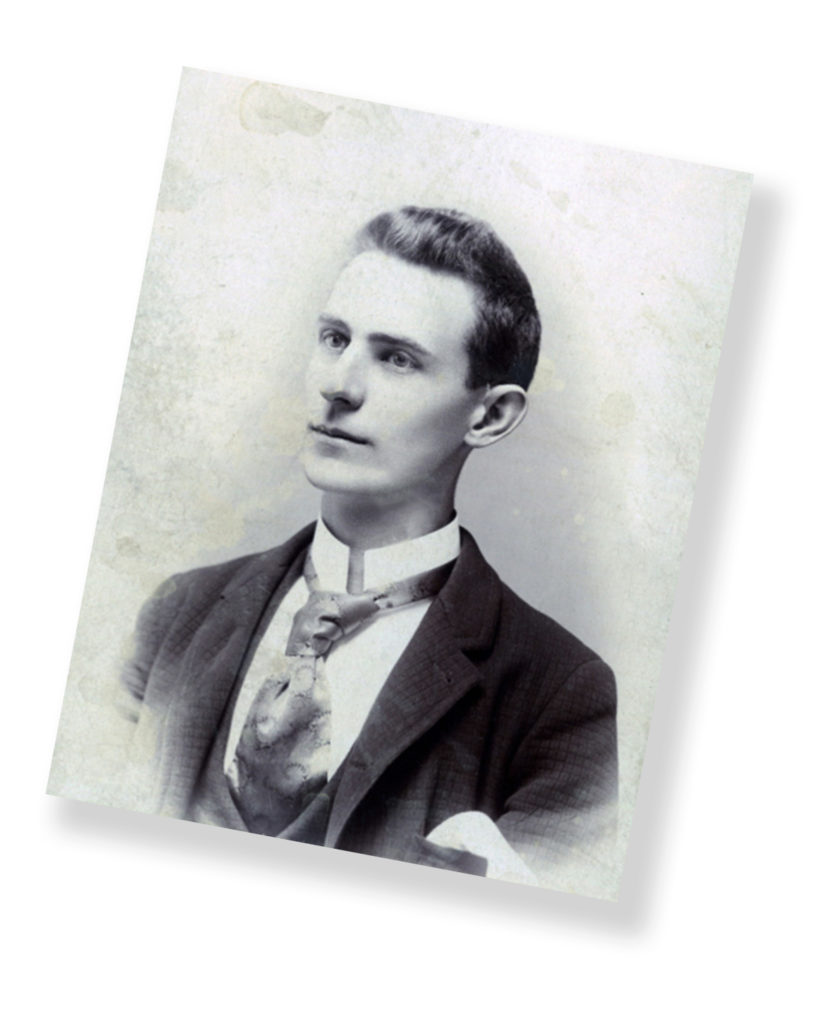
On the Tuesday after the election – the same day the election had originally been set for – The Daily State Capital, blasting red headlines, blistered Haskell: “Will The Grafters Steal The Capital Election By Showing That ‘Yes’ Vote Has Been Carried?” Greer’s newspaper screamed. Other headlines said, “Capital of State Ravished by Brigands From the South,” and claimed that “Haskell’s Attitude Shows People Are To Be Robbed of Rights.”
Possibly Greer’s most famous headline of the day told readers “Czar Charles Issues His Imperial Ukase At New State Capital.”
At the same time, the Oklahoma City’s Chamber of Commerce, the same entity that provided the get-away vehicle to move the state seal, feigned ignorance about the fraudulent move and issued a statement saying they were “surprised” by Haskell’s quick action to relocate the Capital.
In Guthrie, community leaders rushed to District Court. Just a day after the vote, the Guthrie Daily Leader correctly described the atmosphere in a straightforward four-word headline: “Legal Battle Now On,” the newspaper said.
The courts were receptive. It didn’t take long before Logan County District Judge A.H. Huston issued a temporary injunction, which prevented the remainder of state government from moving to Oklahoma City. Copies of the injunction were served on State Auditor M.E. Trapp and State Treasurer J. A. Menefee, the Vinita Daily Chieftain reported.
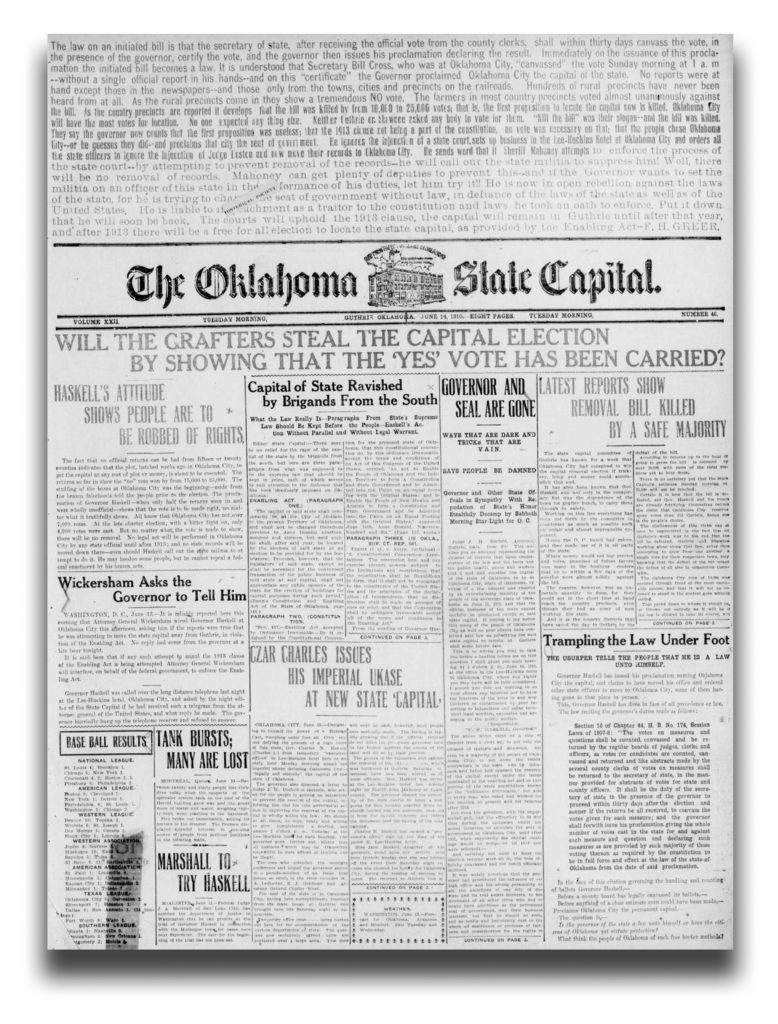
“A member of the state administration Saturday stated, that no intention had Governor Haskell of again opening up the executive offices at Guthrie; he being confirmed in his opinion that the removal bill carried,” the newspaper said.
Other injunctions were filed on Monday, June 13, the first business day after the election. State Attorney General Charles West attempted to defend Haskell’s action in a three-pronged legal argument. West said the district court had no jurisdiction over the position of governor, adding that the action of the governor was not amenable to the court and that the community had insufficient grounds for a legal action.
•
In Guthrie, the residents weren’t taking any chances. At the same time they sought help from state courts, they also turned to the Federal Court for help. On June 13, the Associated Press reported that a Guthrie property owner, W.H. Coyle, filed an application for a temporary injunction in federal court “restraining the state officers from moving state records to Oklahoma City or transacting official business at Oklahoma City.”
Those complaints, documents show, rested on the argument that the election, itself, was illegally called and that Haskell’s action had no foundation or authorization in state law. “The action of the governor and secretary of state were revolutionary,” Coyle’s petition said.
With the decision about the Capital’s location now in limbo, the Oklahoma Supreme Court and other state agencies complied with the courts. While Haskell had set up shop in the Lee-Huckins hotel, the Oklahoma Supreme Court – possibly because of the previous concern of Justice Samuel Hayes – and other state agencies remained in Guthrie.
Haskell continued to point to the election’s questionable returns as proof that he had the authority to move the seat of government. A story published in the Chickasha Daily Express reported that Guthrie Sheriff J. W. Mahoney attempted to serve Haskell with a lawsuit to prevent the removal of state offices but Haskell refused to comply. “Meeting the governor in the lobby of the hotel the sheriff made a step forward to hand the papers to the executive when the governor snatched them from his hands and threw them on the floor,” the Daily Express reported.
Haskell exploded. According to a story in the Oklahoma City Daily Pointer, Haskell doubled down on his move to Oklahoma City. “The Capital is here,” the governor said. “Don’t you worry about where our – blankety blank – old papers and books are!”
Haskell’s tantrum continued. The governor said he had previously told Guthrie residents he would move the capital if “they didn’t quit charging the state $23,000 a year for offices scattered all over town.”
“The people of Oklahoma didn’t move the capital,” Haskell said. “I did it. And no court, either federal or state, has the power to delegate in this matter,” he said. “The capital is here now, and it is all over but the shouting.”
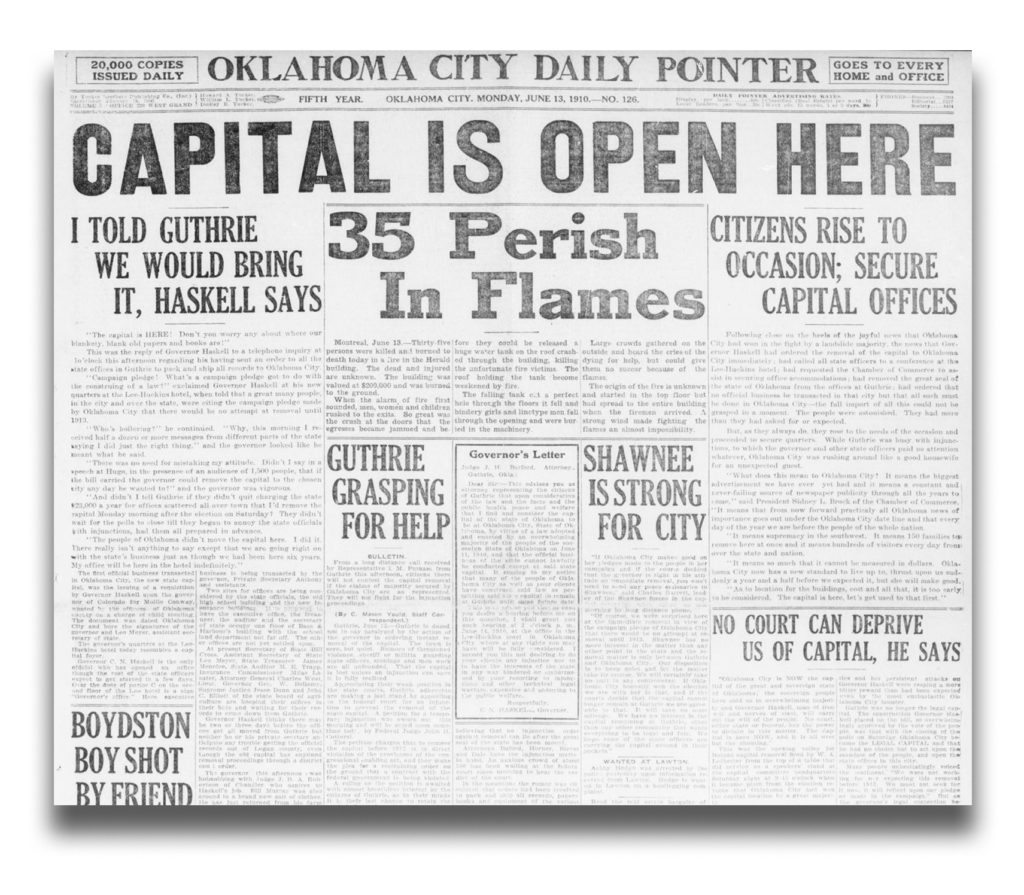
The governor, however, spoke too soon.
Though Haskell’s office did stay in Oklahoma City, other state agencies – including the Oklahoma Supreme Court – remained in Guthrie, and for a time state business was conducted in both place.
This, in effect, gave Oklahoma two state capitals.
A story published in the Washington Post on June 15, 1910, noted that Haskell and Cross, the Secretary of State, were conducting business in Oklahoma City while Meyer, Cross’ assistant, had a duplicate seal and “is transacting official business in Guthrie.”
The Post’s story also reported that guards were stationed at Legislative offices in Guthrie to prevent the removal of state records and other state property. As the debate continued, Labor Commissioner Charles A. Daughtery was searched by guards stationed in Guthrie before he was allowed to leave town. The Post also reported that the adjacent general of the Oklahoma National Guard offered to retrieve state records if necessary.
By July, with tension mounting and the fear of violence growing daily, many state officials – with the exception of Haskell – closed down their temporary Oklahoma City headquarters and returned to Guthrie. Court records show that Cross was held in contempt of court by District Judge Huston. Huston, newspapers reported, insisted that his “injunction be obeyed by all state officers or contempt proceeding (would) be instituted.”
Guthrie businesses celebrated by closing for the day.
By August, both the governor and residents of Guthrie were furious. A story in the Los Angeles Times, dated Aug. 15, said Haskell, now afraid that he would have to return to Guthrie, issued an executive order that required all state officers to move their headquarters to Oklahoma City or he would “declare their offices vacant.”
That day, following a meeting by the state Equalization Board in Oklahoma City, rumors began to swirl that “officers with contempt warrants were coming from Guthrie.”
Haskell responded by threatening those elected officials who stayed in Guthrie.
“I’m tired of humoring District Judge Houston,” the governor said. “From now on the government will be run at Oklahoma City. If Judge Huston wants to act hastily with any of the state officials, I shall protect them, but, beginning Monday morning, if state officers are not ready to conduct business at the capital, I shall appoint someone to fill the vacancy which they have created.”
At least one state official refused to comply, saying the governor had no constitutional authority to remove them. Haskell’s state also drew the ire of the attorney general, Charles West, who had previously defended the governor’s attempt to move the seat of government to Oklahoma City. West, the Los Angeles Times reported, “has given an opinion to State Auditor Trapp advising him not to cash any warrant for state officers’ expenses until the Supreme Court has finally passed upon the state removal.”
Haskell refused to yield. “If this district court at Guthrie has any more contempt for us that we have for it, it’s a bird,” he said. He also began working on his plan to obtain land for construction of a Capitol building. While the court debated his state question, Haskell appointed three commissioners – his friend and advisor Tate Brady, J.B.A Robertson and Dr. Leo Bennett – to find a site to locate the new capital. On the same day the members of the commission were appointed, the group met and picked the location for the new capital in Oklahoma City.
That location was based on a proposal made by Oklahoma City land developer, I.M. Putnam.
Putnam’s plan was big: A 1,600-acre plot in northwest Oklahoma City on the El Reno Interurban Line (which is now Putnam City) and $1.7 million cash. The cash part of the deal would include $1.5 million to construct the capital, $150,000 for furniture, $40,000 for ‘expenses’ by the commission and $10,000 to move the capital from Guthrie to Oklahoma City.
Despite his public statements to the contrary, Haskell had supported the Putnam Plan from the beginning. In fact, at least a year before the plan was adopted, Haskell’s newspaper, The New-State Tribune, featured full-page ads from Putnam’s company about the development. Those ads, plus the $20,000 bonus paid to Haskell by Oklahoma City and El Reno ‘investors’ in his newspaper, raise serious ethical and legal questions about the governor’s efforts to move the capital and his involvement in the capital’s new location.
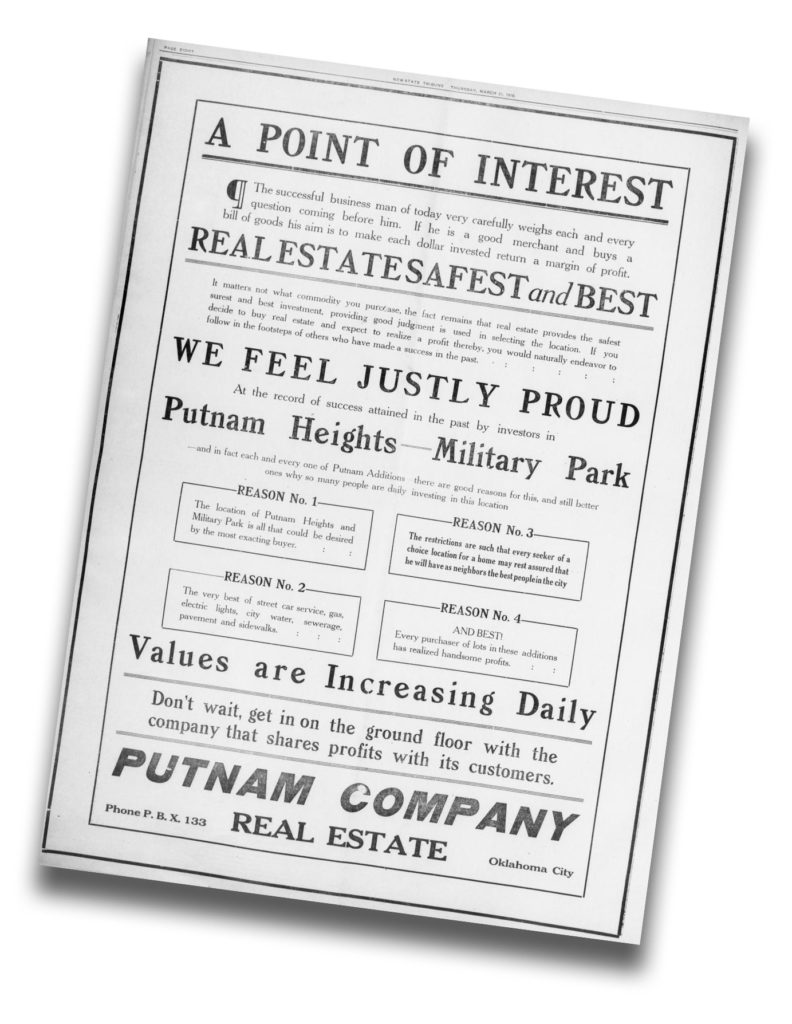
Haskell’s attorney, however, urged the governor to wait. In a letter dated June 13, 1910 – well before the three-man capital commission was appointed – W.A. Ledbetter wrote that he had met with John Wilford Shartel to look at a site for the capital south and east of the Putnam site.
“The situation there appeals to me very much because of the men who are connected with it,” Ledbetter wrote. “They are the real active real estate men, and in my judgement can do a great deal more toward quick action in the way of sale of lots for capital purposes than Putnam or anyone else.”
Shartel, Ledbetter said, “says he is satisfied an arrangement can be made by which a sufficient quantity of land can be donated to build the state capital and that those who own the land in the vicinity will agree to withhold their land from sale until such time as the state can sell enough land to assure the necessary funds to build the capital.”
Should the state put the capital where Putnam wants to locate it, Ledbetter wrote, “the state will have to compete with all of these parties whose lands lie considerably nearer to the city than Putnam’s land.
Putnam, Ledbetter said, was considerably interested in land “sufficiently near to this proposed site to enable him to make a considerable sum out of the enterprise.”
Three months later, on November 15, 1910, Haskell’s scheme began to fall apart. On that day, the Oklahoma Supreme Court threw a wrench in Haskell’s plan. Writing for the majority, Judge John Turner said State Question 15 was improperly worded and, therefore, void. At the same time, though, the court said the provision in the federal Enabling Act was not binding and “either the legislature or the people had the power to locate the state capital at will.”
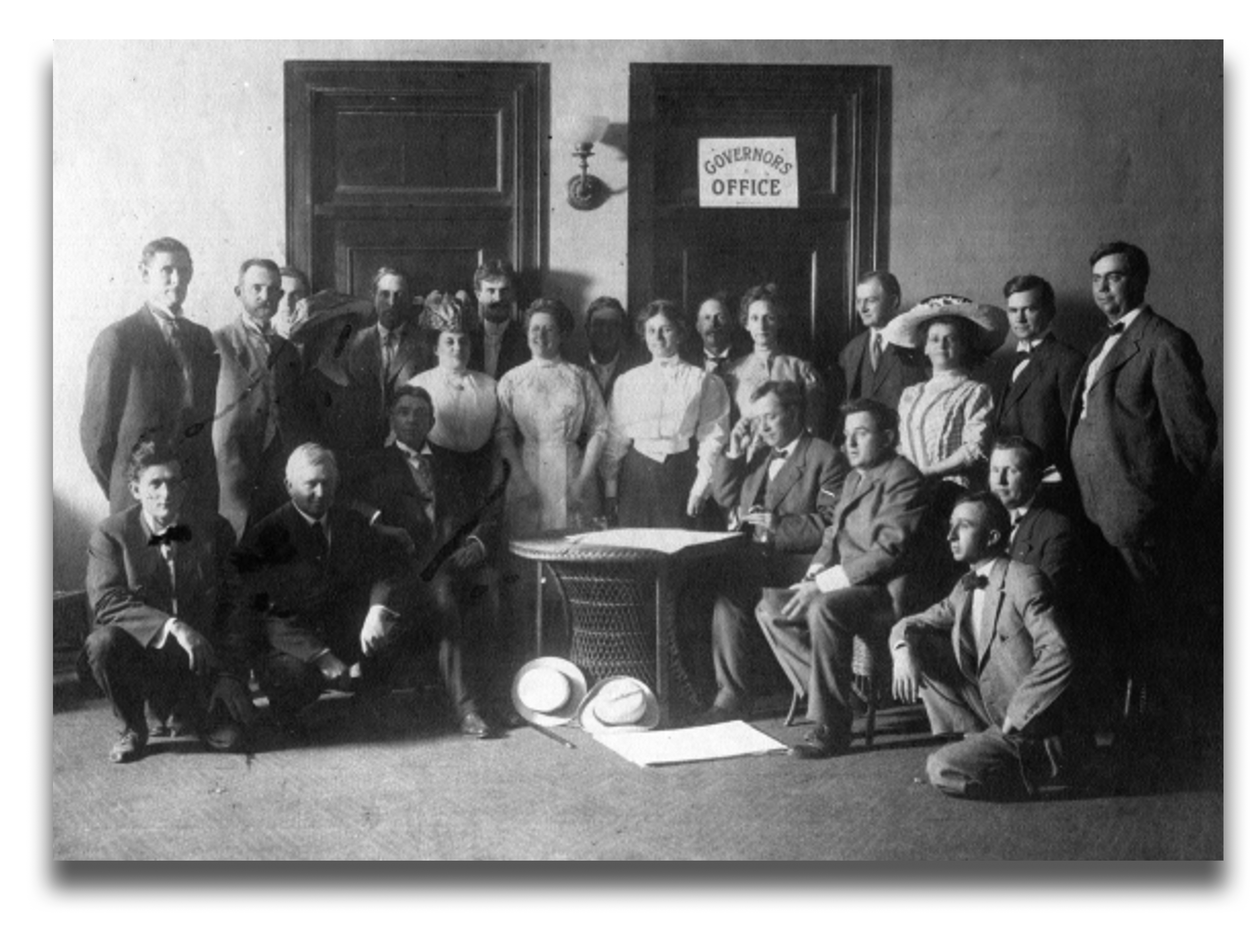
The court’s ruling countered the governor’s last-minute change of the election date and his plan to hide the initiative petition to prevent opposition. Without directly addressing those issues, or the questionable actions of the governor, the state’s high court said simply, “We are, therefore, of the opinion that the statue has not been complied with.”
Judge Hayes, the judge with Haskell in Oklahoma City on the Sunday after the election, voted with the majority.
For the moment, Guthrie residents celebrated. But Haskell, anticipating the court’s action called state lawmakers in a special session just minutes after the court issued its ruling.
The special session, set for November 28, had a single purpose – the removal of the capital.
“I told these Guthrie people a year ago that if they didn’t see that Frank Greer quit calling me a liar every morning, I would get into this Capital fight,” the governor said at a hastily called press conference announcing the special session.
Just after Thanksgiving, the legislature convened. Haskell’s personal secretary, W.B. Anthony, who was elected to the Oklahoma House of Representatives in 1907, was now placed in a more powerful role. In an unusual move, Anthony had been chosen as House Speaker for the special session yet, at the same time he continued to serve as the governor’s personal secretary. After ratifying Haskell’s call for the special session, the legislature introduced several capital removal bills.
The final measure, House Bill No. 7, was adopted, though several amendments were added at the last minute. House Bill 7 passed the Senate on a vote of 35 to 5.. The bill was eventually “whipped through…the next day.”
On December 16, just a month before he termed out of office, Haskell received the measure, which officially moved the capital from Guthrie to Oklahoma City.
Haskell, however, didn’t sign the bill immediately.
Because the legislature had bypassed the decision Haskell’s hand-picked three-person Capital Location Commission, the governor was furious and threatened to veto the bill. Documents show that Haskell was upset that lawmakers refused the deal offered by Putnam and instead located the Capital at its present location, straddling property owned by two prominent Oklahoma City residents, Charles Colcord and William Fremont Harn.
A defiant Haskell sent a message to Oklahoma City’s leadership and its legislative delegation that the city would have to raise $72,200 “to wind up” the previous agreement made by the Capital Location Commission to put the capital in the Putnam City area of Oklahoma City or he would veto House Bill 7.
Putnam had previously announced he had invested $70,000 in the Capital location project.
For years, this decision by Haskell has received little scrutiny. However, in light of the $20,000 bonus paid to Haskell to move his newspaper, The New State Tribune and Tribune’s previous relationship with Putnam, the governor’s statement – viewed through the lens of history – now makes sense.
Because the Legislative Council changed course and did not located the Capital in the Putnam area – shocking both Haskell and Putnam – the governor’s ‘deal’ with Putnam fell through and Haskell had to, in some way, make good on his promise. Forcing Oklahoma City to pay Putnam off, would make Putnam whole and, at the same time, move the Capitol to Oklahoma City.
On Dec. 29, a group of Oklahoma City business reported they had raised all but about $5,000 of the requested amount and issued a pledge to Putnam for the remainder. Haskell accepted the pledge and he, along with Ledbetter, took a train to Guthrie, again acknowledging that Guthrie remained the state capital.
That day, at 8:40 p.m., after having coffee at Guthrie’s Harvey House, Haskell signed three pieces of legislation which ended the twenty-year long fight over the location of the Capital. Haskell’s signature was his last official act as governor in Guthrie. A short time later, Guthrie residents played their final card, appealing the legislature’s decision to the United States Supreme Court.
Five months later, on May 29, 1912, the Supreme Court court ruled in favor of Oklahoma City, saying the newly signed law was not a party of the state’s fundamental law and the location clause of the Enabling Act was void. The ruling also said the Oklahoma statute was constitutional. Writing for the 7-2 majority, Justice H.H. Lurton said the equality of the states “would be disturbed” if the Enabling Act were to be interpreted to prevent Oklahoma from locating its capital as the other states in the Union may do.
Guthrie’s reign as the seat of Oklahoma’s government had come to an end.

